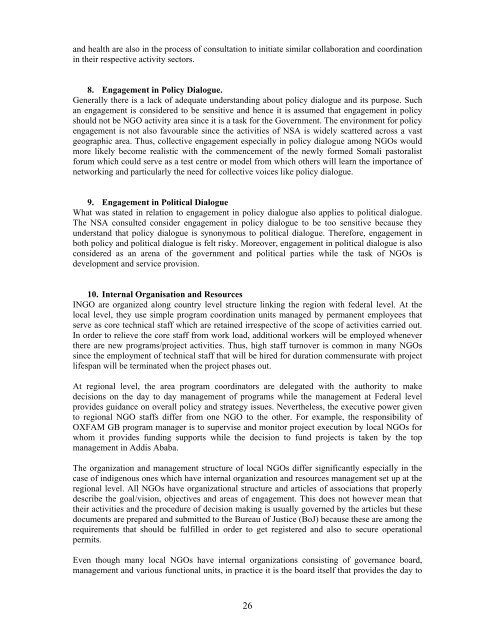Regional Reports - the European External Action Service
Regional Reports - the European External Action Service
Regional Reports - the European External Action Service
You also want an ePaper? Increase the reach of your titles
YUMPU automatically turns print PDFs into web optimized ePapers that Google loves.
and health are also in <strong>the</strong> process of consultation to initiate similar collaboration and coordination<br />
in <strong>the</strong>ir respective activity sectors.<br />
8. Engagement in Policy Dialogue.<br />
Generally <strong>the</strong>re is a lack of adequate understanding about policy dialogue and its purpose. Such<br />
an engagement is considered to be sensitive and hence it is assumed that engagement in policy<br />
should not be NGO activity area since it is a task for <strong>the</strong> Government. The environment for policy<br />
engagement is not also favourable since <strong>the</strong> activities of NSA is widely scattered across a vast<br />
geographic area. Thus, collective engagement especially in policy dialogue among NGOs would<br />
more likely become realistic with <strong>the</strong> commencement of <strong>the</strong> newly formed Somali pastoralist<br />
forum which could serve as a test centre or model from which o<strong>the</strong>rs will learn <strong>the</strong> importance of<br />
networking and particularly <strong>the</strong> need for collective voices like policy dialogue.<br />
9. Engagement in Political Dialogue<br />
What was stated in relation to engagement in policy dialogue also applies to political dialogue.<br />
The NSA consulted consider engagement in policy dialogue to be too sensitive because <strong>the</strong>y<br />
understand that policy dialogue is synonymous to political dialogue. Therefore, engagement in<br />
both policy and political dialogue is felt risky. Moreover, engagement in political dialogue is also<br />
considered as an arena of <strong>the</strong> government and political parties while <strong>the</strong> task of NGOs is<br />
development and service provision.<br />
10. Internal Organisation and Resources<br />
INGO are organized along country level structure linking <strong>the</strong> region with federal level. At <strong>the</strong><br />
local level, <strong>the</strong>y use simple program coordination units managed by permanent employees that<br />
serve as core technical staff which are retained irrespective of <strong>the</strong> scope of activities carried out.<br />
In order to relieve <strong>the</strong> core staff from work load, additional workers will be employed whenever<br />
<strong>the</strong>re are new programs/project activities. Thus, high staff turnover is common in many NGOs<br />
since <strong>the</strong> employment of technical staff that will be hired for duration commensurate with project<br />
lifespan will be terminated when <strong>the</strong> project phases out.<br />
At regional level, <strong>the</strong> area program coordinators are delegated with <strong>the</strong> authority to make<br />
decisions on <strong>the</strong> day to day management of programs while <strong>the</strong> management at Federal level<br />
provides guidance on overall policy and strategy issues. Never<strong>the</strong>less, <strong>the</strong> executive power given<br />
to regional NGO staffs differ from one NGO to <strong>the</strong> o<strong>the</strong>r. For example, <strong>the</strong> responsibility of<br />
OXFAM GB program manager is to supervise and monitor project execution by local NGOs for<br />
whom it provides funding supports while <strong>the</strong> decision to fund projects is taken by <strong>the</strong> top<br />
management in Addis Ababa.<br />
The organization and management structure of local NGOs differ significantly especially in <strong>the</strong><br />
case of indigenous ones which have internal organization and resources management set up at <strong>the</strong><br />
regional level. All NGOs have organizational structure and articles of associations that properly<br />
describe <strong>the</strong> goal/vision, objectives and areas of engagement. This does not however mean that<br />
<strong>the</strong>ir activities and <strong>the</strong> procedure of decision making is usually governed by <strong>the</strong> articles but <strong>the</strong>se<br />
documents are prepared and submitted to <strong>the</strong> Bureau of Justice (BoJ) because <strong>the</strong>se are among <strong>the</strong><br />
requirements that should be fulfilled in order to get registered and also to secure operational<br />
permits.<br />
Even though many local NGOs have internal organizations consisting of governance board,<br />
management and various functional units, in practice it is <strong>the</strong> board itself that provides <strong>the</strong> day to<br />
26

















